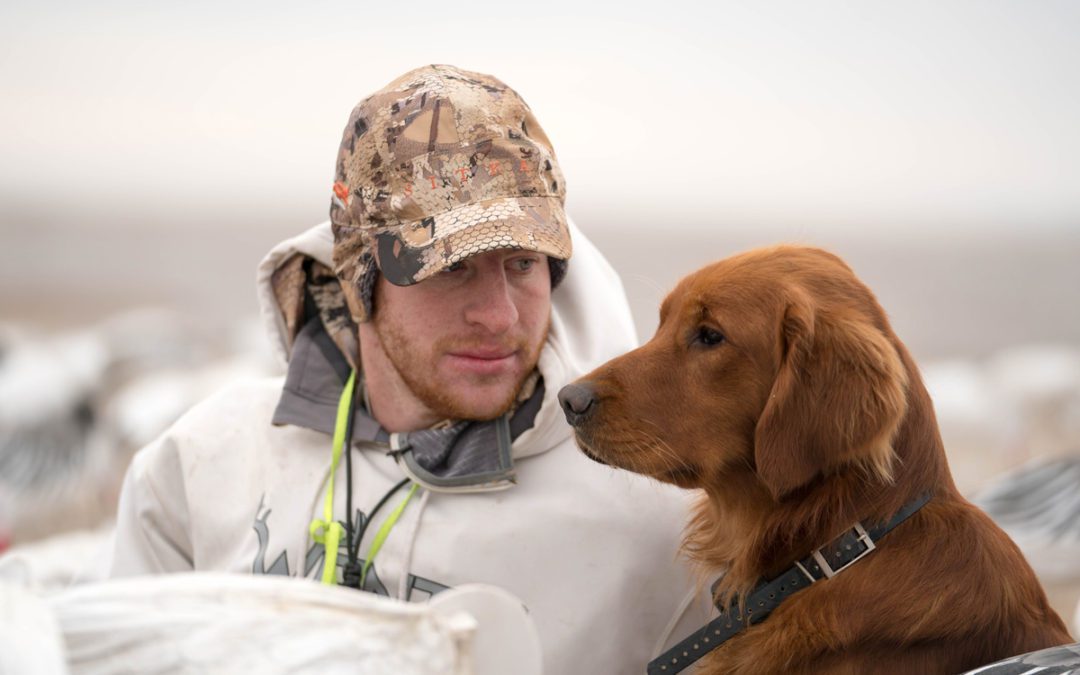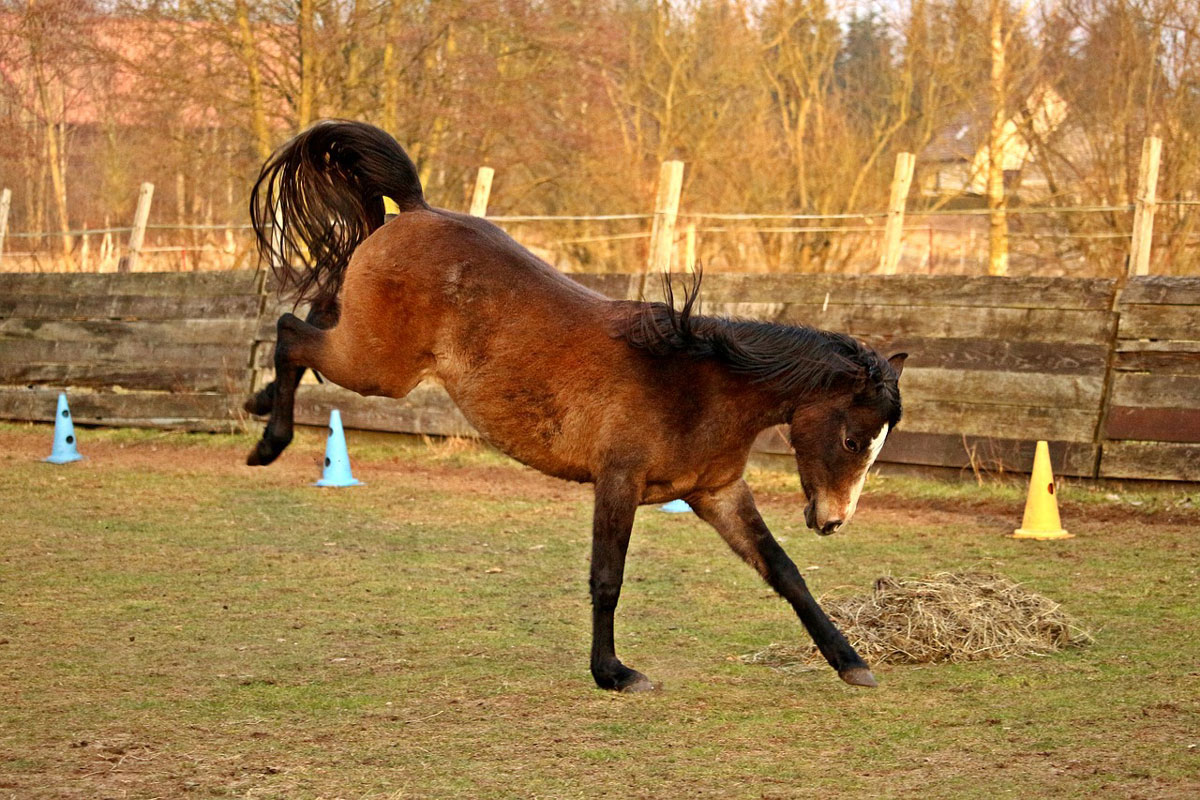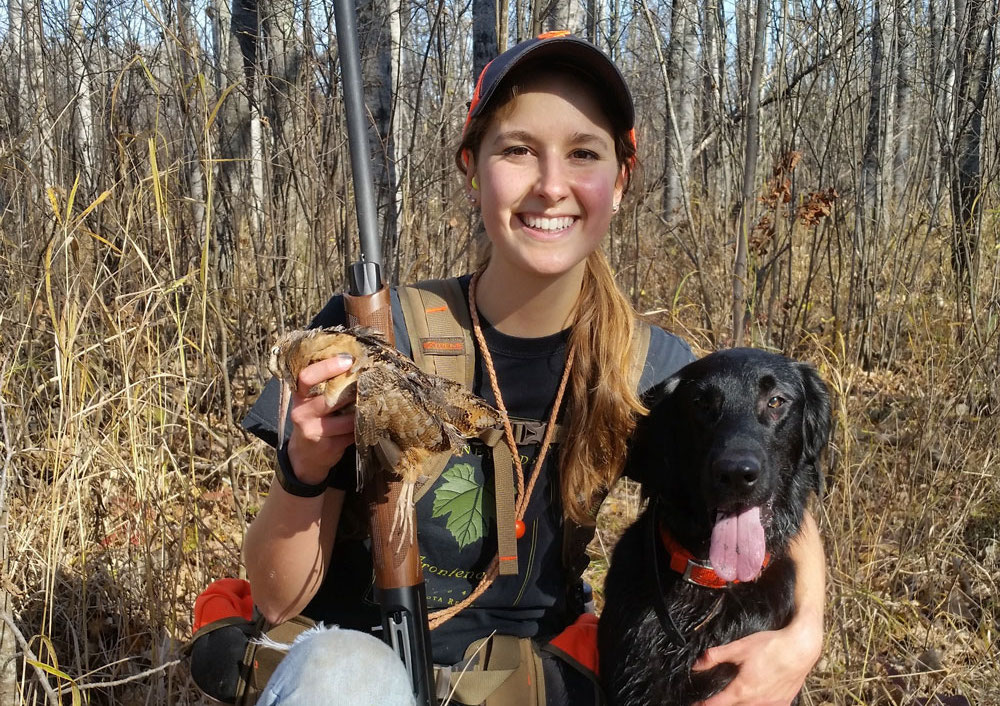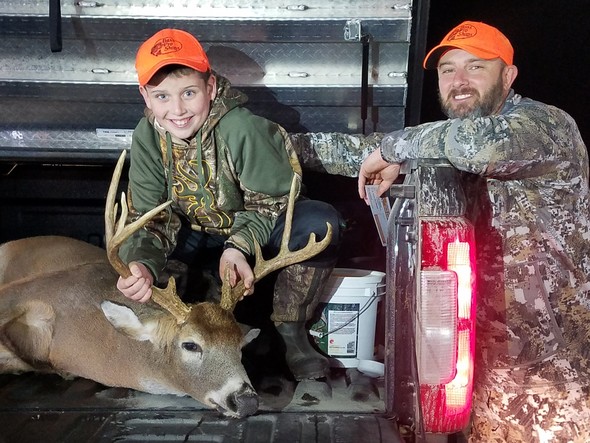The entire state, or about 90 percent of the territory, is home to large ranches and moderate-sized farms. Agriculture is king in a vast swath of land that stretches from the flat Red River Valley, across the rolling plains of the Midwest and on up the slope of the rugged Badlands.
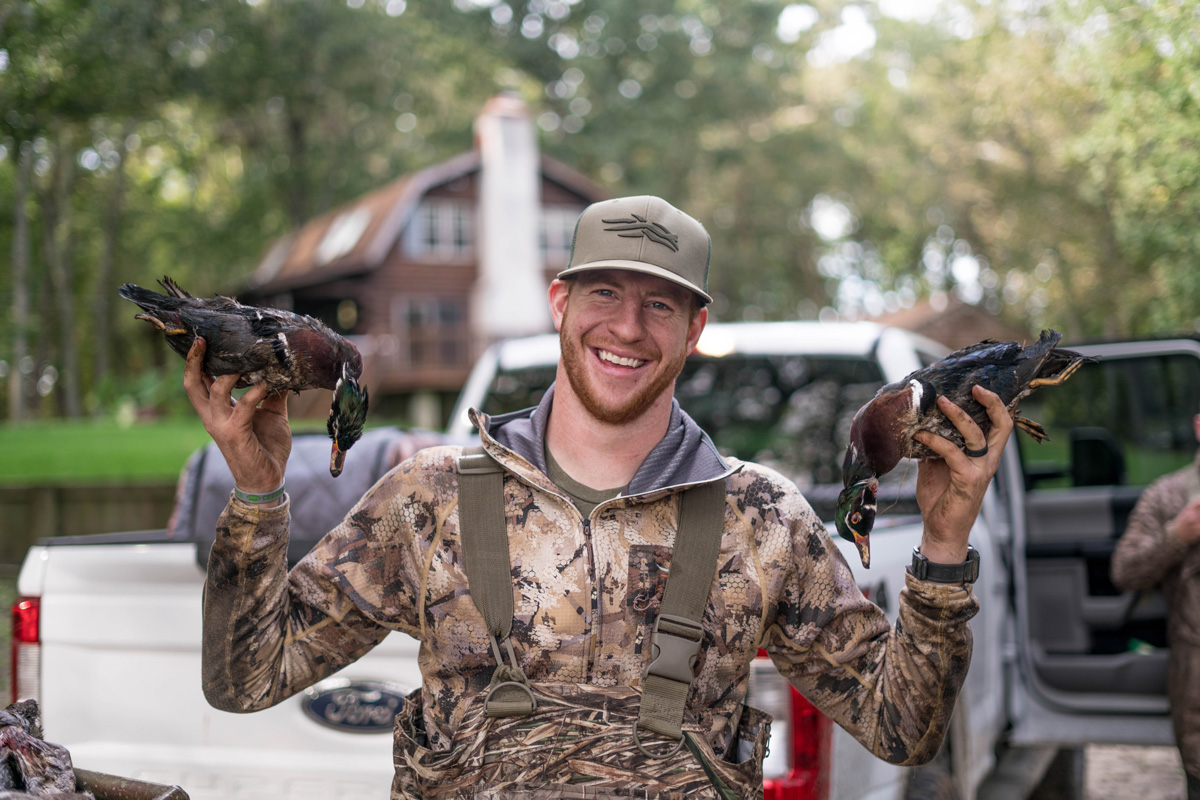
Although wheat is grown in nearly every county, the Roughrider State is also a top producer of barley, sunflower seeds, beans, lentils, oats, peas and sugar beets. And now you know why North Dakota attracts so many non-resident hunters: the entire state is a buffet for white-tailed deer, ducks and geese, along with a variety of upland gamebirds.
With so many ranches and open space, there comes a side-benefit; there are very few people, a fact that makes North Dakota the country’s fourth, least-populated state. It’s pretty easy to connect those dots—an abundance of game combined with a small concentration of hunters is a dream come true.
Carson Wentz, the quarterback for the Philadelphia Eagles and one of North Dakota’s most famous native sons, is playing catch-up on what he missed.
“I don’t know that as a kid I truly appreciated the hunting opportunities we had just past my front door,” Wentz said. “My dad occasionally hunted whitetails, but not birds or ducks. My older brother, Zach, and I would sometimes still-hunt with him when we were in our teens, but it wasn’t a family obsession. Sports were our focus, and if Zach and I weren’t throwing a football, a baseball or playing hoops, we were working out. Add in school and homework, and there just wasn’t time for hunting.
Things changed dramatically for Wentz during his freshman year at North Dakota State University.
“A good buddy was a serious pheasant hunter,” he said. “There aren’t too many college kids that have dogs at school, but he loved to hunt so much that he brought his chocolate lab into the dorm. He hunted a lot and always kept pestering me to go. Sundays were my only day off during the week, so I went along one time.
“Pheasants were going up to the left, to the right; they were going straight-away, and it was an organized chaos, just like football when the pocket breaks down. I thrive on chaos, and I was immediately hooked. Add in other birds like sharptails and Huns in the buttes and grasslands and you’ve got a tremendous day.
“On top of that, hunting has added new dimensions to my friendships, ones that have been growing ever since,” said Wentz.
“You know, I missed more birds that day than I hit. Missing so many kind of got under my skin, and it sort of flipped a switch,” he said.
“I like to work hard; I like to learn and to push myself until I reach my goals. Next thing I knew, I was spending a lot of time at the clays range shooting skeet, trap and sporting clays in order to become a better shot.
“I wanted to run my own dog,” he noted. “I like Labs but really prefer golden retrievers. I bought Henley, who is now 6 1/2 years old, and trained her myself. I read a lot, got some help from friends, and just set about working through drills and training exercises every day.

“As a next step, Henley and I got into duck hunting. North Dakota is at the top of the Central Flyway and has an annual population of around four million breeding ducks and more than a half-million conserved acres. We see so many different species, ranging from mallards, pintails, blue-winged teal, gadwalls and widgeon. When they pitch in at first light, it’s the same kind of organized chaos that I see in the upland and football fields. I absolutely love it all.”
Wentz is a family man, and on a bye-week he trades his home in southern New Jersey to hunt with his brother, father and friends in North Dakota.
“Playing professional football can be stressful, and hunting is the best way I know of to totally relax,” he said.
“On one trip, Zach brought along a GoPro and videotaped our hunts. He edited the footage and created two episodes that turned out to be the pilots of what is now known as Wentz Brothers Outdoors. The show isn’t staged; it’s all natural, with two brothers spending time on the water and in the woods doing what they love to do.
“That show has expanded, and is now featured on Sportsman Channel and Outdoor Channel. A recent episode is of our archery red stag hunt in New Zealand. It’s a little odd that we have hunted chamois, red stag and tahr in New Zealand, but not elk or mule deer in the Rockies. That’s not because of lack of interest, but because of football commitments. I don’t think coach would be too happy if I chose to chase a six-by-six in October instead of suiting up on game day.
“Other hunting opportunities will have to wait until my football career is over, and when the time comes, I’ll be ready.”
Wentz’ commitment to high levels of performance have attracted the attention of some big-name sponsors. Sitka and Eukanuba both sponsor Wentz Brothers Outdoors. According to David Everson, chief marketing officer of Eukanuba and Royal Canin USA, “Carson and Zach reflect important qualities like hard work, authenticity and the desire to win, which is why this is a perfect match for the Eukanuba brand. Their Sportsman Channel show is very well done, and we hope viewers will enjoy it as much as we do.”
The Wentz brothers are much more than entertainers. One way they embrace community is by offering a series of Faith-based outdoor camps for children. In addition to Bible study, the children learn all the basics of how to fish, shoot and hunt. The brothers have expanded their camp to include 10 hosted hunts for children with physical or emotional disabilities.
“Zach’s and my interest in working with young kids comes from the fact that a lot of teachers and coaches gave us a lot,” Wentz said. “The impact of Faith became important to me during the same year when I learned to hunt. Bible study was part of our team meetings, and it was then that I realized just how much Jesus gave to us all. I decided that I needed to give back, and that’s why I created the A1 Foundation.
“It’s called the Audience of One and focuses on helping as many people individually. Sometimes they’re our youth camps, while other times it’s through our free food trucks. These trucks are spread throughout Philadelphia and provide meals to the homeless just as they do to professionals running in between meetings or college students on their way to class,” he explained.
“It’s important to me to give back in any way, especially if it involves our sporting heritage.”
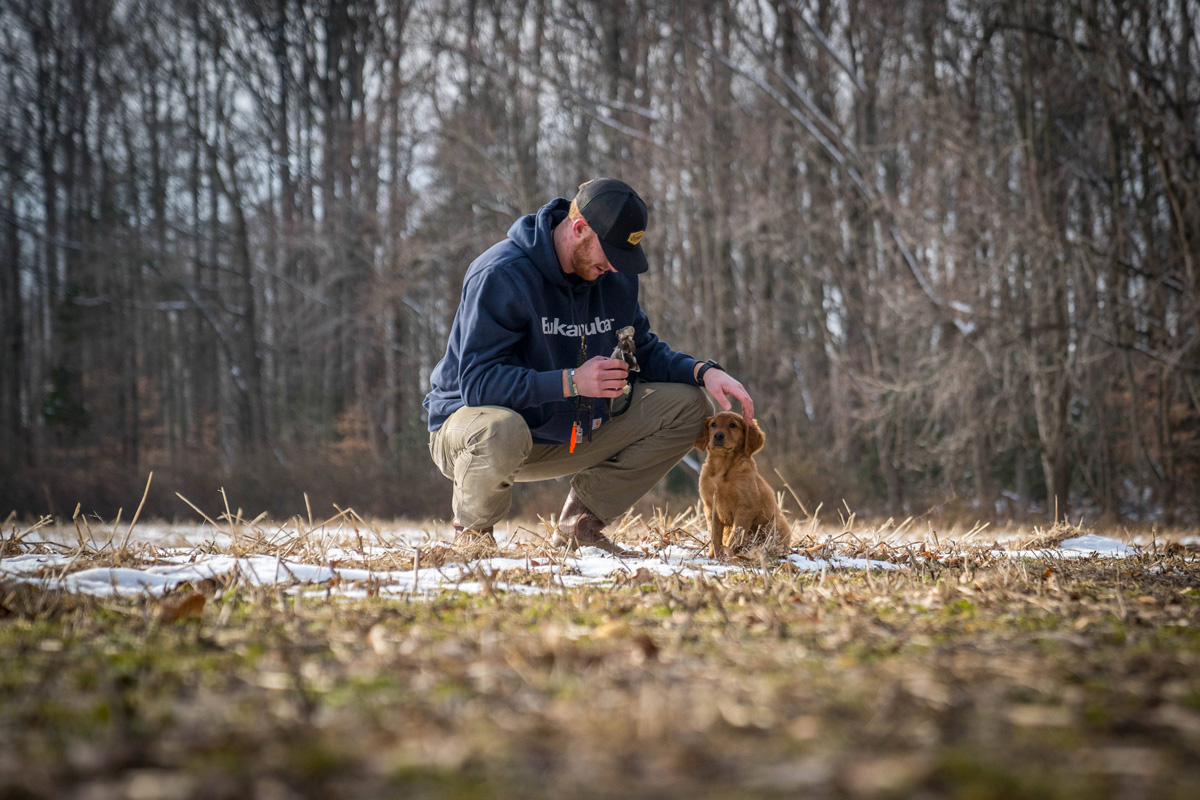
Wentz’ hunts aren’t limited to extended travels; he also makes time to hunt near his home in southern New Jersey. He sharpens his hand-eye coordination on a sporting clays course in his backyard just as he shoots 3-D targets with his bow.
Along the way, he’s assembled more than 700 acres of farmland to hunt, a number he achieved by knocking on doors and asking for permission.
“It’s the way we do things in North Dakota,” he said,” and it works just as well in New Jersey.
“After a long practice, I’ll take some time to sit in a stand near my home. Sometimes I’ll scout, other times I look to see if any deer are browsing my food plots.
“I don’t need to harvest a buck or doe every time I’m in the stand,” he said. “But spending time in the woods helps me get closer to the Lord.”
Praise the Lord and Pass the Ammunition was a song written in 1942 about a World War II sky pilot in the South Pacific. The chaplain set down his Bible, uttered the words, and climbed into a battleship’s gun turrets to open fire on attacking fighter planes.
When I think of Carson and Zach Wentz, I think of that song. But in their instances, it applies to the work they do in grain fields, in duck blinds, and on the rugged New Zealand slopes.

